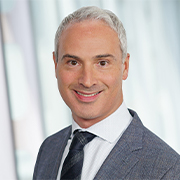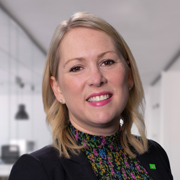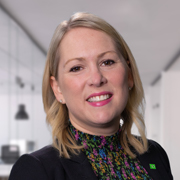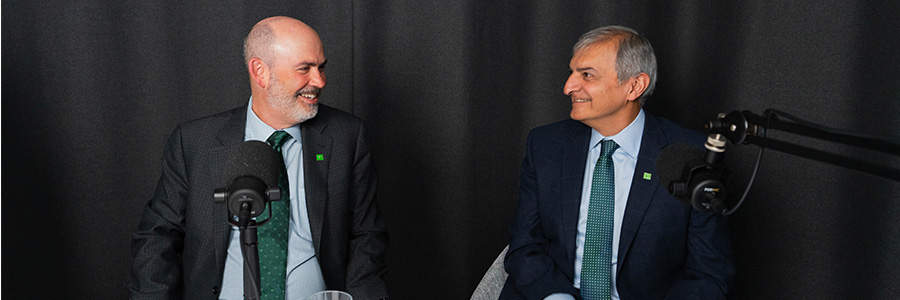Guest: Yaron Werber, Managing Director, Equity Research, TD Cowen
Host: Amy Van Arnhem, Managing Director and Head of Canada Senior Relationship Management, TD Securities
Explore the growth and achievements of the biotech industry over the years as Yaron Werber speaks with host Amy Van Arnhem. Together, they look ahead to the impact AI could have on healthcare, M&A activity, and the unique characteristics of leading markets in the U.S., Europe, China, and Japan.
For deeper insights with guests from leading biotechnology companies, tune in to Yaron Werber's podcast series, Biotech Decoded
This podcast was originally recorded on July 15, 2024.
NARRATOR: Welcome to Viewpoint, a TD Securities podcast. Listen in as we draw perspectives from a variety of thought leaders on key themes influencing markets, industries, and the global economy today. We hope you enjoy this episode.
AMY VAN ARNHEM: Hello, and welcome to Viewpoint, a TD Securities podcast. My name is Amy Van Arnhem, and I will be your host for today's episode. I'm joined by my colleague, Yaron Werber, Managing Director and Senior Research Analyst on TD Cowen's biotechnology team.
Yaron is responsible for providing analysis on large, mid, and small cap biotechnology stocks. He has over 20 years of experience as a research analyst and has served as an executive in a public biotechnology company. Yaron, thank you so much for joining me today.
YARON WERBER: Thank you so much for having me on, Amy. I'm usually in your seat. And I think your seat is harder than this seat, but let's see.
AMY VAN ARNHEM: I think I might agree with you, but we'll give it a go today, and then you can let me know at the end. So I thought first it would be great to provide the listeners just with a bit of background of your career journey and what it is specifically about the biotech sector that keeps you so interested.
YARON WERBER: We started our career about 24 years ago, right after med school and business school. I always thought I wanted to be a surgeon, a reconstructive surgeon. But wanted to go to business school, and I wanted to do something that combines it. And then increasingly, I wanted to do something in entrepreneurial environment and in an entrepreneurial sort of field.
And we actually started doing business development in e-health. And then the 2000 crash happened. And we realized pretty quickly that I don't really need a medical degree to do e-health, and biotech was super exciting.
So we spent about a year sort of working in BD in a couple of companies as a consultant while we were looking for a job on Wall Street, and then started our career. Lucky enough to get a job at Cowen, first as an associate in equity research. Then went to another big firm-- was there for about 11 or 12 years around the health care and biotech team.
And then, as you mentioned, I was a CFO and Chief Business Officer of a small company from private to public. And then we went public through Cowen. Cowen was one of our biggest shareholders, and we came back about 6 and 1/2 years ago.
And the reason I brought all of this is because biotech is super exciting. I mean, at the end of the day, you're basically discovering new biology, and you're creating new therapeutics that literally save lives. When I started, HIV was fairly lethal. Patients would die of multiple myeloma in six months. Hepatitis C wasn't cured. People were getting chemo.
I mean, now, myeloma, you can live for 10 years. HIV is a chronic disease. Hepatitis C has been cured. Oncology-- increasingly, people are not getting chemo. So this is a super exciting, fast-paced field. We love the biotech area, and then we love being within the equity research component. Couldn't have asked for a better career, so to speak, and a better field.
AMY VAN ARNHEM: Well, I have to say, it is certainly a very complex sector. And so what we're hoping today to do is to just sort of hit on some of the key themes and topics, and really guide the listeners around some of the ways that they can start thinking about the sector and what's going on and how they can maybe learn a little bit more about it.
So with that, maybe we can start off with a really big question, which is just to provide that overview of the current landscape in the biotechnology sectors. So what are some of the key trends driving growth and innovation?
YARON WERBER: Yeah. So it's a great question. So maybe to give the audience a bird's-eye view, and I want to talk about it from the company perspective and how we view the companies.
So there's large-cap companies. These are basically pharma companies, like an Amgen or Gilead or Regeneron or Vertex. They are global, very profitable. They also plow a lot back into R&D. They run their own studies. They have their own sales forces and they grow. And several of them even give a dividend. So they're as big as a traditional pharma. They're really not that different.
Then you have the mid-cap companies that are very early in their commercial life. They might just be profitable, but not yet. But they might have a product on the market. Or they already have products in development that already showed good data, and now they're running the bigger studies to actually get registration.
And then you have the small-caps that are super entrepreneurial, early stage, smaller companies, sort of fast-moving, either trying to do something better than what the bigger companies are doing, or innovate totally differently. And then you have the private, obviously, landscape as well.
There is a tremendous amount of innovation in the field. We'll talk about what's driving it is new technologies, new understanding of genetics, genetic basis of diseases, new biology, new ways to target things. Can give somebody a pill. You can give somebody an injection with an antibody or a protein, or now, gene therapy, or different agents to do genetic therapies to modify different things.
And the indications that you're targeting is anything from cholesterol, big, big neuropsychiatry, depression, to a mutation that might happen in 1,000 people around the whole world. There's obviously going to be different price points for these things.
What's definitely driving the sector is also M&A. The bigger traditional pharma companies need new products, and they typically buy the biotechs to innovate. So that helps the biotech field.
Because if you Zoom out of the 600 or so companies, 500 or so public, et cetera, very few of them are ever going to become commercial or are ever going to be profitable. So the success rates are low. And that's why you need M&A to give you a big premium to then justify continuing to invest in the sector.
There are consistent financing needs, and it's a very healthy sector that because of its ability to innovate historically, and that obviously got a lot of boost during COVID, had a tremendous amount of investment in it. These days, of course, anything except large-cap tech is out of favor. So smaller cap tech, and certainly, biotech is not in vogue. So financing is harder. But these things are cyclical, and they come back over time.
AMY VAN ARNHEM: That's a great start-- an overview of just the company landscape and the different scales of companies operating. As a quick follow-up to that, and maybe a good time just to talk about some of the global perspective. So what are some of the unique characteristics of the biotech landscape in the US, and then other leading markets in Europe, China, and Japan?
YARON WERBER: Yeah, it's a great question, and it dovetails in your question about Canada. And Canada is actually a decent market. Usually, companies get to Canada fairly quickly.
So the US market is by far the biggest from a reimbursement perspective and investment and innovation perspective. And you really need the combination of all three. You need to be able to get reimbursed, which drives, then, investment.
And then you need the entrepreneurial basis and the big technology hubs at a university. So we have Boston. We have the San Francisco area. We have a big pocket in the Seattle area. You have a big pocket in New York City now, actually. You have a big pocket increasingly in the Research Triangle in North Carolina. And you always have a few things around Texas.
And so in Europe, there is a very good technology and great universities, but reimbursements have been fairly scattered-- different depending where you go. And by and large, since the global crash of 0 8, reimbursement has gotten harder, and it takes a lot longer. And the pricing is under tremendous pressure in Europe.
So Europe has been, I would say, consolidating into the big five versus the rest of the EU and under a lot of pressure-- pricing pressure, and because of it, access pressure. And that goes along with it the innovation pressure. So typically, companies that are promising will perhaps finance in Europe, and then they'll do an ADR quickly into the US.
Then you have historically Japan, that I would say has been a little insular. There's obviously very proud and very successful with huge legacies-- Japanese companies.
They have been a little bit more insular and Japanese-oriented. They've been trying to go global. The market's been fairly stable. There's always pricing pressure, but it's very predictable and it's prescriptive. By and large, pricing has been good. And so the Japanese market's always a very good market to go into.
And then China has been obviously a huge growth sector from an innovation standpoint. They really are very fast followers. 10 years ago, they weren't that savvy as a drug development sort of landscape. It became a lot different, and they've really caught up a lot.
They're not quite there yet, but there's a lot of innovation coming out of China. There's a very robust entrepreneurial culture and company basis, and reimbursement is tough. It's tough. Even if the Chinese government is not trying to regulate pricing necessarily, there is so much competition, that inevitably, the competition leads to a huge, huge pressure on pricing.
So it's probably not as big of a market commercially. But China is hoping to become a global superpower from a biotech perspective, and they are making great strides.
AMY VAN ARNHEM: Maybe just switching gears, it would be great just to dig a little bit more into AI and how it's impacting the sector. I think that it's been a pretty-- an exciting moment now with AI showing its value in discovering better targets, designing new compounds, and improving clinical trial design, along with many other applications across the health care value chain. How are AI and big data being utilized specifically in biotech research and health care delivery?
YARON WERBER: It still is very early in what AI means, and it's changing in sophistication fairly rapidly. I would almost lump it into three different things. I would lump it into the drug development area, the provider area, the patient area.
And the drug discovery, AI and big data are increasingly being used to identify new genes. You might look at 100,000 patients, and which ones seem to have more cancer or asthma? And is there something about their genetic makeup that certain genes pop up?
And then you can start exploring those genes and double-clicking on them and seeing whether they're really are causing the asthma or the cancer, or they're just associated with it. Are they druggable or not?
You're also going to be looking at new biology and associations between pathways, again, to discover new targets for drug development. Then separately, then you need to design the drug, whether it's a small molecule chemical, like you take like an aspirin by mouth, or whether it's a biologic or gene therapy. And so increasingly, AI is doing a lot to virtually now design new chemistry or design new antibodies, proteins, and validate them virtually.
So you're not going to have to work on 200,000 compounds. You can then decide 50, and just work in those 50 in a real wet lab in the real world. You could do that in a much faster way.
They're also looking at a lot of simulations about, how do you actually target that target? Because that target changes all the time. So you have computers modeling that to design new drugs.
Then on the delivery side, there's anything from robotics to diagnostics that will say, hey, in the medical record, this patient has this level and this level and this level in their blood test. They're at higher risk for X, Y, Z.
And it gets tagged into the electronic medical record. This patient has this mutation. And wow, they have lung cancer, and they have this mutation. This is the drug you should think about. You would think that most physicians, even oncologists, will immediately think this patient has this mutation. It doesn't happen.
And then looking at treatment pathways. Hey, you should try this first, and then you should try that, and then you should try this and helping physicians make decisions and minimizing mistakes.
And then to the patient, there's a lot that goes on to target patients and identify them. There's obviously a lot that needs to happen on the confidentiality side and identity protection.
But when you're a biotech company that's developing a drug for 1,000 patients around the world, trying to find those 1,000 patients, not just commercially, but to enroll them in the clinical study, it's not that easy to do. So patient identification, patient coordination. And then obviously, there's a lot being done these days on education, physician education, and marketing, virtually.
AMY VAN ARNHEM: Just thinking in terms of all of the dynamics happening in the sector, maybe just pulling it back a little bit, from an investment perspective, what are some of the key considerations for investors right now looking at this sector?
YARON WERBER: If you're a large-cap company that has profits, the ones who are giving a dividend are probably growing earnings at around 10%, growing revenue single-digit. And so they are growth at a reasonable price, and they're giving a dividend. And there's a few of those.
Most companies in large-cap that are not giving dividends are still very much growth stories, growing earnings. If they're very mature at a 15% to 20% rate, and if you're there in the early stage, you can be growing earnings for five, seven years at 35% to 50%, or 25% to 50% annually. And they can get to pretty good margins as well. It's a question how much they're spending on R&D.
And the smaller cap companies and mid-cap-- people are looking for absolute returns. And they're looking for multiple returns to take the risk. Because sometimes if a product doesn't work, and it's the only one in development, the stock could be down 80% when they have negative results. And so they're looking for multiple baggers.
Now, a few mid-caps, when they work, these stocks can be up over their lifetime 20- to 40-fold. We've seen many of those who went from 1 billion to over 100 billion market cap in our career. So several of those. I shouldn't say many. Obviously, small-cap, you're looking for acquisition premiums as well.
On the M&A side, there's still very robust environment, robust volumes. If you look at this year, it's on track to outpace last year. The difference-- we're seeing higher volume, same to higher volumes, but lower deal sizes. And that's because interest rates are up. So cost of capital is up. But more so, the bigger buyers, a lot of them have done deals, so they don't have necessarily as much of a balance sheet room.
But also, the Federal Trade Commission in the US, and even in Europe, they've become a little finicky on deals. So they're waiting to go through the election before they continue to do big deals. But the valuations are much lower. It's harder for companies to raise capital. And, again, the buyers are facing patent cliffs, so they do need to replenish their pipeline.
Even though the sector is still out of favor, we are actually in positive territory this year, the capital base is much more sizable than it's been in the past, and it comes from a variety of sources internationally, sovereign funds, obviously, pension funds, venture capitalists, public capital. And so companies and funds really are flush with capital. And so it gives you still very much a robust innovation environment
AMY VAN ARNHEM: Maybe just thinking along those lines, what is your outlook for the rest of 2025? And with the US being such a huge market and in an election year and everything else happening, what are you thinking for the sector going out into next year?
YARON WERBER: We feel that we've been in an early recovery. This is not the time to pound the table bullish, but valuations are fairly attractive or close to a trough. If you look at the sector on an absolute basis, it's underperformed the broader indices by 50 to 100 basis point. Now, of course, we're coming in from amazing three years during the pandemic where biotech could do no wrong, so to speak.
But the sector is sensitive to interest rates, and we're in an early recovery. This reminds us of the years following the genomic crash, where there was some increasing interest rates. Biotech was more, I would say, divorced from the economic environment. This time it's more sensitive because higher interest rates for longer theme has really taken hold.
And so it's really large-cap tech that's innovative because of AI. That's kind of where you can get your returns from, but with attractive valuations and amazing amount of innovation and much better certainty now on access, given that Inflation Reduction Act has passed, and much less, I would say, concerned about the political landscape.
Democrats and Republicans more or less have the same view now of biotech. And it's probably going to be less sensitive to the election outcome and much more sensitive to what interest rate cuts are going to start happening.
AMY VAN ARNHEM: You mentioned at the beginning that you're also a host of a podcast. It's called Biotech Decoded, as part of TD Cowen's series. What do you guys focus on specifically, and what type of guests do you have on the podcast?
YARON WERBER: It started by being a podcast that's going to talk about innovation, that's going to talk about strategy. It's going to weave in boards and c-suite guests to discuss what actually happens behind the scenes, what happens in a room where it happens, talks about deals. And then very much bringing investors to talk about what they see and how innovation and value attribution happens on their side. And so really to stimulate a conversation from both sides to make the whole drug discovery process maybe a little bit more smooth and efficient.
AMY VAN ARNHEM: Well, that's great. So listeners that have found interest and value in this, they can dig in a little bit more by going back and listening to some of your previous and then future podcasts as well. So that's great.
And I really have appreciated you coming on and giving us an overview of a very complex sector and being able to break it down in such a short period of time. So thank you so much for joining us. We really appreciate it.
YARON WERBER: Thanks for having me on. This is my first podcast as a guest, so--
AMY VAN ARNHEM: Oh, wow. OK. I like it. You've got to do more now. [LAUGHS]
YARON WERBER: Will do.
[MUSIC PLAYING]
NARRATOR: Thank you for listening to Viewpoint, a TD Securities podcast. If you enjoyed this episode, subscribe to this series on Apple Podcasts or on your favorite podcast platform. For more thought leadership content, visit tdsecurities.com, and follow us on LinkedIn for all the latest TD Securities updates. For relevant disclaimers to this podcast, please refer to the Viewpoint episode page on our website.
This podcast should not be copied, distributed, published or reproduced, in whole or in part. The information contained in this recording was obtained from publicly available sources, has not been independently verified by TD Securities, may not be current, and TD Securities has no obligation to provide any updates or changes. All price references and market forecasts are as of the date of recording. The views and opinions expressed in this podcast are not necessarily those of TD Securities and may differ from the views and opinions of other departments or divisions of TD Securities and its affiliates. TD Securities is not providing any financial, economic, legal, accounting, or tax advice or recommendations in this podcast. The information contained in this podcast does not constitute investment advice or an offer to buy or sell securities or any other product and should not be relied upon to evaluate any potential transaction. Neither TD Securities nor any of its affiliates makes any representation or warranty, express or implied, as to the accuracy or completeness of the statements or any information contained in this podcast and any liability therefore (including in respect of direct, indirect or consequential loss or damage) is expressly disclaimed.


Yaron Werber, M.D., MBA
Managing Director, Health Care – Biotechnology Research Analyst, TD Cowen

Yaron Werber, M.D., MBA
Managing Director, Health Care – Biotechnology Research Analyst, TD Cowen
Dr. Yaron Werber is a Managing Director and senior research analyst on TD Cowen’s biotechnology team. In this role, Dr. Werber is responsible for providing analysis on large-, mid-, and small-cap biotechnology stocks. Dr. Werber has 20+ years of experience as a research analyst in the financial services industry and has served as an executive in a public biotechnology company.
Prior to rejoining TD Cowen, Dr. Werber was a founding team member, chief business and financial officer, treasurer and secretary of Ovid Therapeutics, a biotechnology company focused on developing transformative drugs for orphan disorders of the brain. In this role, Dr. Werber established and was responsible for all financial planning and reporting, business development, strategy, operations/IT and investor and public relations and human resources functionality. Dr. Werber also led negotiations to secure several pipeline compounds including an innovative partnership with Takeda Pharmaceutical Company, a deal that expanded Ovid’s pipeline and pioneered a novel approach for partnering the focused expertise of small biotech with big pharma.
This deal was chosen by Scrip as a finalist for the 2017 Best Partnership Alliance Award. In addition, Dr. Werber oversaw all financing activities and led a $75 million Series B round in 2015 and Ovid’s $75 million IPO in 2017. In that capacity, Dr. Werber was selected as an “Emerging Pharma Leader” by Pharmaceutical Executive magazine in 2017.
Prior to joining Ovid, Dr. Werber worked at Citi from 2004 to 2015, where he most recently served as a managing director and head of U.S. healthcare and biotech equity research. During his tenure at Citi, Dr. Werber led a team that conducted in-depth analyses of life science companies at all stages of development, ranging from successful, profitable companies to recently public and privately held companies. Previously, Dr. Werber was a senior biotech analyst and vice president at SG Cowen Securities Corporation from 2001- 2004.
Dr. Werber has been awarded several accolades for performance and stock picking, he has been highly ranked by Institutional Investor magazine, has received awards from Starmine and was voted among the top five analysts in biotech in the Wall Street Journal’s “Best on the Street” Greenwich survey. He has frequently been featured as a guest on CNBC, Fox News, Bloomberg News and has been quoted in the Wall Street Journal, New York Times, Fortune, Forbes, Bloomberg thestreet.com and BioCentury.
Dr. Werber earned his B.S. in Biology from Tufts University, cum laude, and a combined M.D./MBA degree from Tufts University School of Medicine where he was a Terner Scholar.


Amy Van Arnhem
Managing Director and Head of Canada Senior Relationship Management, TD Securities

Amy Van Arnhem
Managing Director and Head of Canada Senior Relationship Management, TD Securities
Amy is responsible for providing holistic cross product global coverage to senior executives for Canadian institutional clients. In her role she manages stakeholder relationships by promoting a collaborative and integrated approach across the firm. Joining our firm in 2001, Amy began her career at TD in the retail sector. In 2007, she joined the Sales and Trading rotational program at TD Securities where she gained exposure in Asset Securitization, Proprietary Equity, and Institutional Equities. In 2008, she joined the Institutional Equity Sales desk team where she covered Canadian equity clients.






